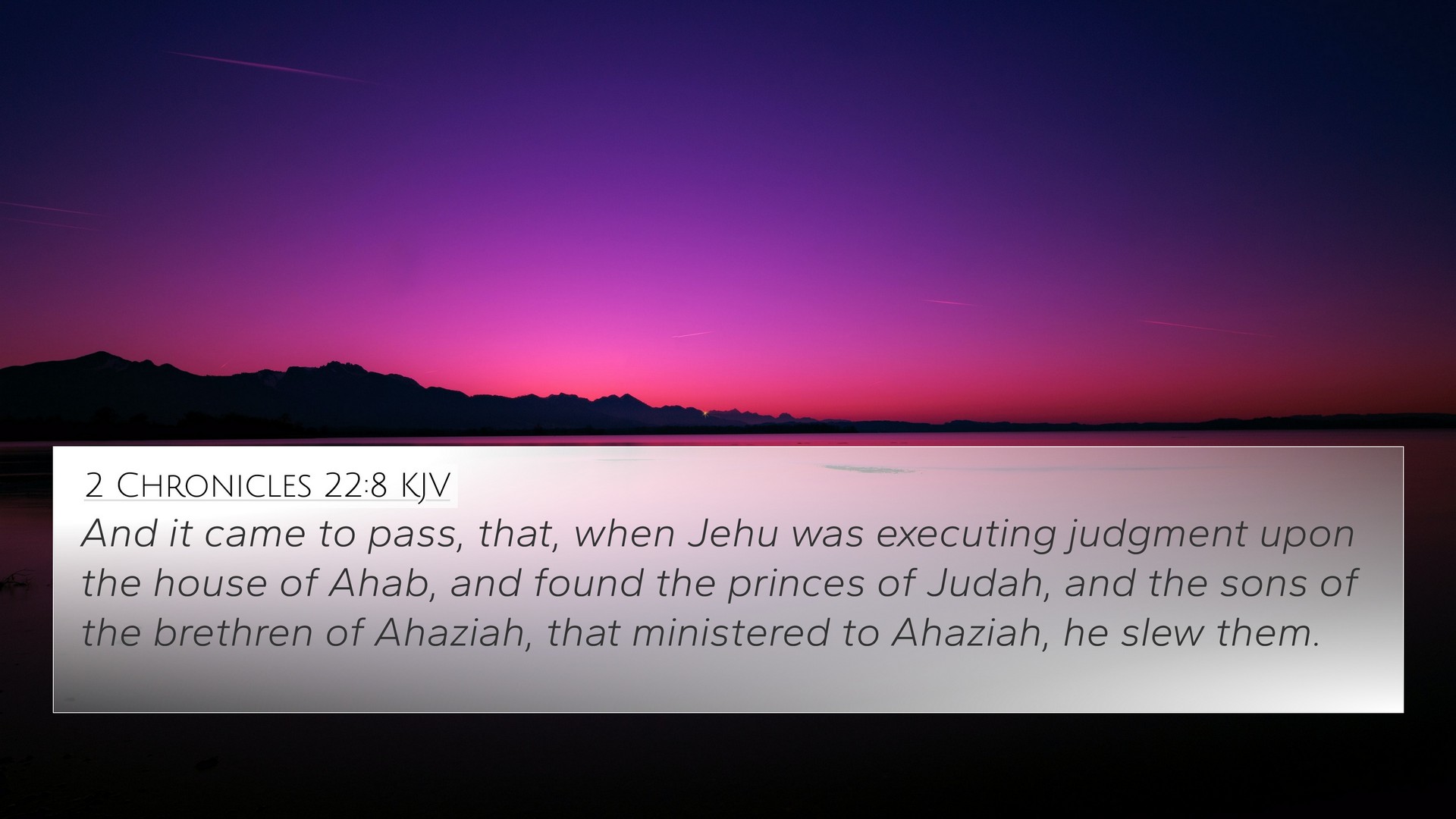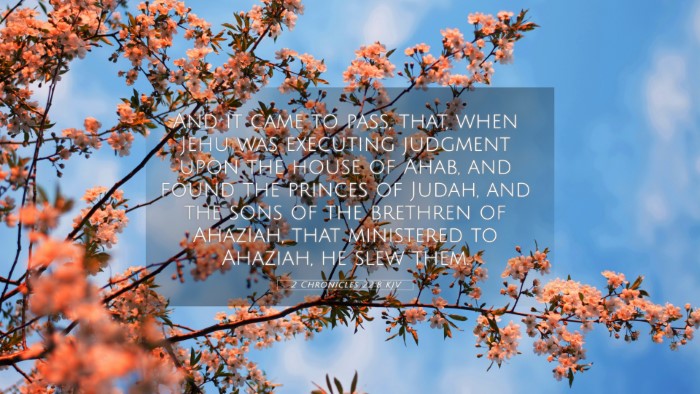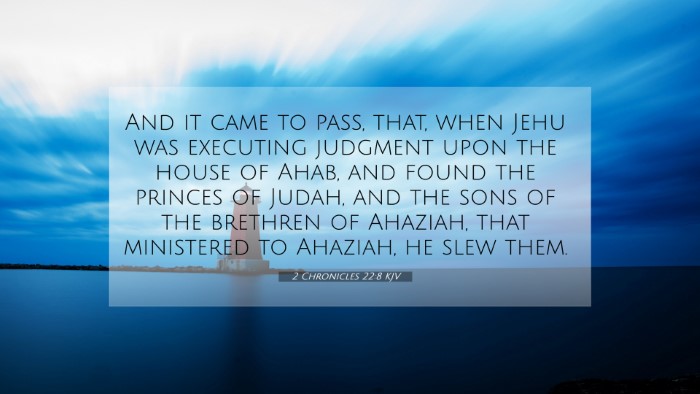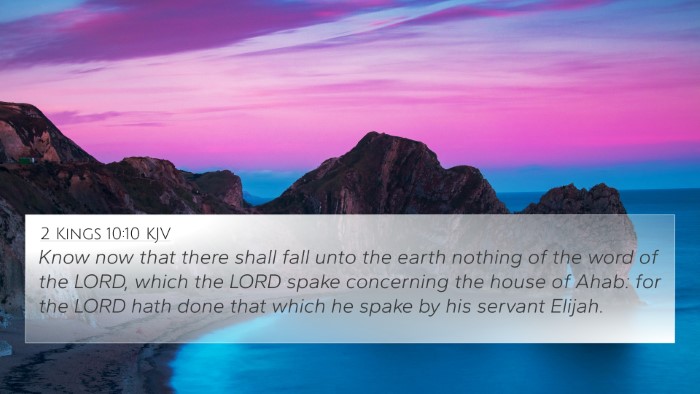Understanding 2 Chronicles 22:8
The verse 2 Chronicles 22:8 states: "And it came to pass, that when Jehoram was risen up to the kingdom of his father, he laid wait for his enemies and took them." This passage provides critical insights into the political and spiritual decay of Judah during the reign of Jehoram. Below, we explore its meaning through a synthesis of interpretations from respected public domain commentaries, revealing thematic connections with other scripture and the broader narrative of the Bible.
Context and Background
Jehoram, who ruled the kingdom of Judah, ascended to the throne following the death of his father, Jehoshaphat. Jehoram's reign is often marked by his alignment with the ways of Israel, particularly in idolatry and wickedness, as he married Athaliah, the daughter of Ahab and Jezebel. This context is crucial in understanding the implications of 2 Chronicles 22:8.
Significance of Jehoram's Actions
Jehoram’s decision to “lay wait for his enemies” indicates a strategic and often treacherous approach to governance. After consolidating power, he reportedly sought to eliminate any threats to his reign. The thematic connection here highlights the dangers of political ambition devoid of righteousness, echoing the fate of many biblical figures.
Thematic Bible Verse Connections
This verse can be connected to several other biblical passages that delve into themes of kingship, idolatry, and the consequences of sin. Here are a few notable cross-references that relate to the themes presented in 2 Chronicles 22:8:
- 2 Kings 8:25-26 - Jehoram’s alignment with the kingdoms of Israel through marriage and idolatry.
- 2 Chronicles 21:4 - Jehoram’s killing of his brothers to secure his position.
- 2 Kings 9:21-24 - The fate of those who oppose Jehoram’s rule.
- Genesis 4:8 - The theme of treachery and premeditated violence in human history.
- Proverbs 29:2 - The repercussions of wickedness in ruling authorities.
- Isaiah 3:1-5 - Warnings about the consequences of corrupt leadership.
- Jeremiah 5:30-31 - The prevalence of deceit and treachery among the leaders of God’s people.
Commentary Insights
Albert Barnes comments that Jehoram's rise to power signified a shift towards more pagan practices and emphasizes the importance of his disastrous marital alliances.
Matthew Henry notes that Jehoram’s actions were not only politically motivated but also spiritually detrimental, showcasing a king who disregarded God’s ways.
Adam Clarke elaborates on the implications of Jehoram's conduct, comparing it to historical figures who similarly sought their own power at the expense of divine guidance.
Moral and Spiritual Lessons
Jehoram's actions serve as a stark reminder of the consequences of a life driven by ambition and power over righteousness. The moral vacuity in his character mirrors various warnings found throughout scripture regarding maintaining faith and duty to God.
Linking Bible Scriptures for Deeper Understanding
When studying 2 Chronicles 22:8, it is vital to consider how this passage engages with broader biblical themes:
- Leadership and Responsibility: Verses like 1 Timothy 3:1-7 highlight the qualifications of a leader under God's rule.
- Judgment on Wickedness: Ezekiel 18:30 calls for turning from sin to avoid punishment.
- The Importance of Faithfulness: Echoed in Matthew 25:21, where faithful stewardship is rewarded.
- Consequences of Sin: Galatians 6:7 depicts the truth that one reaps what one sows, playing out in Jehoram's life.
- Divine Authority vs. Human Ambition: Proverbs 16:9 manages the layers of planning within God’s providence.
Conclusion: A Deeper Analysis
In concluding our analysis of 2 Chronicles 22:8, we see a rich interconnection between the law of God and the history of Israel’s kings, particularly Jehoram. His actions serve as an echo to the consequences of straying from divine principles, emphasizing the necessity of aligning leadership with God’s command. The narrative of Jehoram reminds us of the importance of examining our motivations and the spiritual impacts of our decisions, inviting further study of linked passages.



